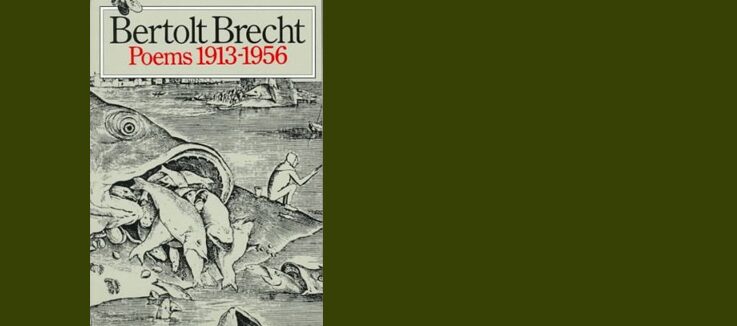In the green duffle bag I carried there was a two-volume set of the Oxford English dictionary, a pair of jeans, two t-shirts, a few pens, a Palestinian kaffiyeh, a notebook and Bertolt Brecht. When I was making the choice about what to put in the duffle bag it was always clear that the dictionaries and Brecht would go with me. The pens were ephemera. The notebook was a little luxury because if need be I could always write clandestinely in the margins of the dictionaries. The Palestinian kaffiyeh, I stuffed in the bag at the last minute – a flag, an emblem of last resistance. When it rolled out of my duffle bag during the search, its crisscrossed stitching caught the American soldier’s eye as something he should recognise but it had escaped him. The dictionaries and Brecht’s Poems 1913–1956 had travelled with me everywhere, they moved into and out of many apartments in Toronto.
And, that year, 1983, when I decided to go to work in Grenada they travelled there with me and throughout the Caribbean archipelago – so from Toronto to Ottawa, Ottawa to St. Georges, from St. Georges to Vieux Fort, from Vieux Fort to Roseau, then to the dormant volcano La Soufriere up the windward side of St. Vincent, back to St. Georges, and now in the duffle bag, leaving a hiding place on an incline above a Fire Station, along a road lined with American soldiers, and artillery, on my way to a temporary U.S. military base. So weary were these books that the glue on back of Brecht’s Poems 1913–1956 had succumbed to the sea air and the constant movement, falling open presciently to the pages of “The Darkest Times.”
The revolution had brought me to Grenada and the U.S. invasion was driving me out. Brecht’s poems were my companion – there was a certain grim sadness to them that mirrored what I felt for the invading Americans and the demise of the revolution.
As he fled Germany he wrote:
Fleeing from my fellow-countrymen
I have now reached Finland. Friends
Whom yesterday I didn’t know, put up some beds
In clean rooms. Over the radio
I hear the victory bulletins of the scum of the earth. Curiously
I examine a map of the continent. High up in Lapland
Towards the Artic Ocean
I can still see a small door. (The Darkest Times, 1940 –VIII)
I could not help but feel the same watching the great triumph of the U.S. over the tiny Grenada. Along with arming the Contras in Nicaragua at the time it was only the latest demonstration of U.S. intervention in Latin America and the Caribbean.
But I confess I did not see Brecht’s ‘small door’ on the map of that archipelago 25 years ago, he was far more hopeful than I.
And all along the road to the U.S army camp another of his poems resonated:
Fog envelops
The road
The poplars
The farms and
The artillery (The Darkest Times, 1940 – IV)
One only had to replace the fog with heat glaze, the poplars with poui. In fact all of his poems in this collection of more than 500 poems, find their resonances in the ordinary lives of people anywhere in the world at the mercy of power, ideological and material. That Brecht’s poems still do this work today, more than half a century after his death, is both a gift and a pity. Of course everyone knows Brecht’s great plays and those plays have their stark poetry. The power of his poems is the clarity and reach of his insights. I find an intense affinity with his poems – his work as an artist engaging his time, exploring the cellular membrane of the aesthetic and the ethical speaks to my own approach to art. There is something, deeply recognizable, in his hard sad honest eye.
 Dionne Brand © Jason W. Chow
Dionne Brand,
Dionne Brand © Jason W. Chow
Dionne Brand,
Toronto
